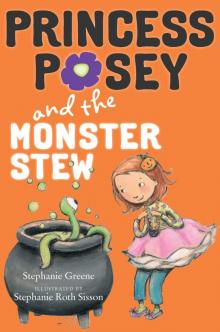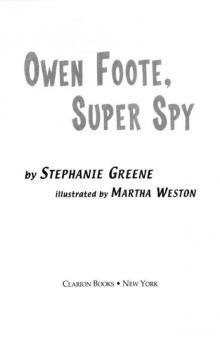- Home
- Stephanie Greene
Sophie Hartley, On Strike Page 4
Sophie Hartley, On Strike Read online
Page 4
When Sophie found her mother fast asleep on the couch after dinner, sitting up with her glasses on her nose and her book open on her lap, she was seized with a brilliant inspiration. Quietly, so as not to wake her, she sat down and put her mouth up to her mother’s ear.
“No . . . more . . . family . . . job . . . list,” she whispered in what she hoped was a soothing hypnotist’s voice. She leaned forward and looked into her mother’s face.
Nothing.
“No . . . more . . . family . . . job . . . list,” she whispered, more insistently this time.
“No more dinners if you go on tickling my ear like that,” her mother said in a normal voice without opening her eyes. She reached up and rubbed her ear.
“No fair,” said Sophie. She sagged against her mother’s side. “Don’t you even feel a little hypnotized?”
“Not one bit.” Her mother laughed and put her arm around Sophie’s shoulders. “But I’ll give you credit for not giving up easily.”
“I’m still mad at you,” Sophie said, trying to hold on to the indignation she’d felt this afternoon when her mother had refused to listen about Thad and made Sophie do all of her jobs. Mrs. Hartley had even double-checked to see how well she’d done them. Sophie hadn’t finished until one o’clock. To make matters worse, Thad came home at five o’clock after having lost his basketball game and seemed to have completely forgotten that he and Sophie were partners in crime. He locked his bedroom door when she tried to come in and turned up his music, full blast.
Try as she might, Sophie could feel her anger oozing out of her as her mother ran her fingers slowly through Sophie’s curls, gently untangling the knots Sophie always got from lack of brushing. It was peaceful sitting there, just the two of them: Maura and John were in bed, Nora was spending the night at a friend’s, and Thad would be at a party until eleven o’clock.
“You are the master of your fate, you are the captain of your soul,” her mother said. She always quoted from that poem whenever she wanted to tell them they were in charge of their own lives.
“I don’t want to be the captain,” Sophie said grumpily. “I bet Jenna and Alice did something really fun again.”
“Maybe they got facelifts!” Mrs. Hartley said brightly. “After all, they’re nine.”
“Ha-ha, Mom.”
Her mother swept Sophie’s hair away from her forehead and gave her a light kiss right above her scowl line. “How about if you go make some popcorn while I go up and wash my face and get into my bathrobe,” she said, smiling. “You and I can actually watch a movie we want to see without having to negotiate with the boys.”
“Can I pick it?” said Sophie, sitting forward.
“Sure. But nothing with guns and fast cars.”
“Okay. And nothing with policemen.”
Sophie ran into the kitchen and scrambled up onto the counter. She wasn’t even going to point out to her mother that making popcorn wasn’t on the job list, she thought happily as she opened the cupboard. That’s how good she suddenly felt.
Chapter Four
Sophie saw the rest of the class lining up at the door to the cafeteria, which meant she wasn’t going to get to finish telling her story about Thad. Not that Alice and Jenna seemed all that interested.
She probably shouldn’t have started with the toilet.
Alice, who was an only child and thought that having an older brother was romantic, giggled and said, “Thad’s so cute.” But Jenna knew how disgusting brothers could be and was totally unimpressed.
“Eeuuw,” she said, with a fussy little shake of her head, “who wants to talk about toilets?” and started describing their visit to the beauty parlor on Saturday with her grandmother instead. She kept saying, “Right, Alice?” and “Remember?” as if Sophie needed to be reminded that she hadn’t been there.
It was all they talked about for the rest of lunch. “My hair was as hard as a rock,” reported Alice.
“I thought it looked beautiful.” Jenna shook her head so that the tiny braids covering it rattled their beaded ends together. She’d been doing that all morning. Sophie was sick of it.
“You looked at least eleven,” said Jenna.
“My mom said I looked forty-five.” Alice, who was wearing her normal ponytail, had looked resigned. “And my father said I reminded him of his great-aunt who went bald and had to wear a wig made out of horsehair.”
“Oh, really!” Jenna gave another rattle. “My grandmother said we both looked very feminine.”
“Feminine?” said Sophie. She frowned. The word made her feel vaguely embarrassed, as though it was one of those “personal” things they weren’t supposed to talk about until they were older. “What’s that supposed to mean?”
“You know.” Jenna shrugged. “Looking like a girl.”
“What else is Alice supposed to look like? She is a girl.”
“My grandmother said it’s good to be feminine,” said Jenna.
“You don’t even like your grandmother,” said Sophie. “You said she’s bossy. You like your grandfather better. He takes you to baseball games.”
“My grandfather died last year, in case you didn’t know,” Jenna said with an injured rattle of her beads.
“Too bad,” Sophie said feelingly.
“You two—don’t fight,” said Alice. She looked at Sophie with a wave of red already moving up over her face and said, “I think it means . . . you know . . . ladylike.” Alice lifted up her shoulders as if she was trying to hide her scarlet face and added, “Kind of . . . soft inside.”
Sophie was horrified. Alice’s face looked the same way Nora and her friends’ faces looked when they huddled on the beds in her and Nora’s room during a sleepover and talked: embarrassed and excited at the same time.
Nora always pushed Sophie out of the room before she could hear what they were talking about, saying, “Sorry, but you’re too young for girl talk,” and shut the door firmly in her face.
Sophie was just as glad. She thought girl talk was silly. And now her two best friends were doing it.
“I’m sick of talking about hair,” she said. “It’s boring.”
“That’s only because you weren’t there,” said Jenna.
“Jenna, that’s mean,” said Alice.
“Sorry, Sophie.” Jenna tilted her head to one side and stuck out her lower lip to make it look as if she was sincere. But Sophie knew she just wanted to feel the beads against her cheek.
“We missed you,” Jenna said.
Sophie stuffed her half-eaten sandwich into her lunch bag and stood up. “You are so transparent, “ she said.
“So?”
It was totally deflating. Sophie wished she’d thought of it herself.
“Three forks, three knives, three spoons?” asked Mr. Hartley as he sat down at the dinner table. He held up the large soup ladle that had been lying next to his knife. “What kind of feast are we having?”
“I ran out of regular spoons,” said John, who was now stacking napkins in neat piles beside each place setting.
“John, I told you not to do that,” said Mrs. Hartley, peering at him through the steam rising from the pot she was stirring.
“It’s John’s week to set the table,” Nora explained to their father. She finished pouring milk into a row of glasses on the counter and began ferrying them over to the table. “Thad helped him come up with a plan so he only has to set it once.”
It wasn’t such a bad idea, Sophie realized as she banged the plate of bread and butter on the table. She could see every plate, glass, and bowl in the house, stacked in piles that would dwindle as the week went on.
“If John gets to do it, so do I,” she said.
“John!” said Mrs. Hartley.
“Dummy,” John muttered to Sophie, picking everything back up. “Big fat dummy.”
“Don’t go upstairs empty-handed!” Mrs. Hartley called from the family room after dinner. She did that automatically when she heard someone heading for the stairs, the s
ame way she called, “Lift the seat!” when she heard someone go into the downstairs bathroom. Or “Turn off your lights!” when they all came charging down the stairs for dinner.
Sophie looked at the piles of assorted belongings Mrs. Hartley regularly collected from around the house and left on the stairs for people to carry up to their rooms. “None of it’s mine!” she shouted.
There was a thunderous silence from the family room.
Sophie grabbed a pile and continued up the stairs. “Don’t you come up empty-handed, either,” she said crossly when she heard someone start up behind her.
She turned around just in time to flatten herself against the wall as Thad barreled past her carrying his saxophone case. “Sorry, my hands are full!” he called cheerfully as he disappeared down the hall.
“You could carry something under your arm!” shouted Sophie. Then, “No fair!” when she heard his door slam.
So that’s why Thad gave up the violin for the saxophone. He said it was because he wanted to play in the school’s jazz band, but now Sophie knew it was really so that he’d have something big to carry and wouldn’t have to bother with their mother’s piles.
Fine, she thought mutinously. From now on, she was going to start carrying something big of her own. Maybe she’d take piano lessons and really show Thad. She could hardly be expected to carry a pile when she was carrying a whole piano, now, could she?
She was brooding her way down the hall to her room when she heard somebody on the stairs and ran back to supervise. John was halfway up, leaning against the wall for balance and taking one careful step at a time, a bucket of Legos in each hand.
“No fair!” wailed Sophie, and promptly dropped her pile in protest.
“Who left this mess in the hall?” Mr. Hartley said in a loud voice some time later.
“Not me,” Nora said, her head in her homework.
“I did,” Sophie called. She put down her horses and hurried into the hall. “I forgot,” she muttered. She could feel her father’s eyes on her back as she scuttled around like a crab on the floor at his feet, collecting things. Only after he moved off down the hall did she feel bold enough to add, “It’s not even on the list.”
By the next morning, it was.
“Why don’t you get a cleaning lady? They do everything,” Jenna said as the three of them walked into school.
“I don’t know about everything,” said Alice. “My mother cleans our house before the cleaning lady comes.”
“Okay, but all you have to do is make your bed, right?”
Alice nodded. “Really, Sophie,” she said earnestly. “Tell your mother to get one.”
“I don’t think she wants one,” said Sophie.
“How can she not want one?” asked Jenna. “Everybody does.”
Sophie thought about all the times her mother had said, “Do I look like a cleaning lady to you?” when she reminded them to pick up after themselves. She didn’t make it sound very respectable. And the one time Thad joked, “As a matter of fact, Ma, you kind of do,” Mrs. Hartley got mad at him.
“I’m almost positive my mother doesn’t,” Sophie said.
“Maybe it’s because she never had one,” Alice said helpfully. “If she had one, I bet she’d like it.”
“It can’t hurt to ask,” said Jenna.
But of course it did.
“Are you joking?” Nora said scornfully when Sophie brought it up in their bedroom after school. Sophie was changing her clothes to go outside and ride her bike. Nora had put her books and notebooks on her desk in neat piles in preparation for doing homework. Ever since Thad had started taking AP classes in high school, she’d been working harder than ever, trying to keep up.
“Mom and Dad can’t afford a cleaning lady,” she said. “Why do you think they’re working more hours?”
“Because we’re poor?” said Sophie, immediately feeling that they were.
“Don’t be such a baby. They don’t have a lot of extra money, that’s all.” Nora whipped her hair back into a ponytail as if it had done something to offend her, and sat down. “Stop worrying and go away. I have to do my homework before chorus practice tonight.”
But Sophie couldn’t stop worrying. She brought the subject up again at dinner.
“I wouldn’t have a cleaning lady even if we could afford it, which we can’t,” her mother said comfortably. She passed a plate piled high with chicken to Nora on her right, while deftly taking a bowl of carrots from Thad on her left. She had made Mr. Hartley remove the lazy Susan from the middle of the table after the night John and Thad had started spinning it like a roulette wheel and sent a bowl of beets flying onto the floor. Now they were supposed to practice saying polite things like “Please pass the bread” and “May I have the carrots?” during dinner.
“Please don’t pass the carrots,” John said loudly when she was about to serve him some. “I hate cooked carrots.”
“Your father and I believe that helping out around the house builds character,” Mrs. Hartley went on, putting a small pile of carrots on John’s plate. “Why do you think we had five healthy children? Well, only four can help right now,” she said, with a fond smile at Maura in her highchair.
“If you didn’t have so many children, maybe we could afford a cleaning lady,” said Nora.
“And you’d all be spoiled rotten,” said Mrs. Hartley.
“I could live with that,” said Thad.
“I think a person should be a certain age before they get a cleaning lady, don’t you, Mom?” Sophie said encouragingly.
“Yeah, right, Sophie.” Nora rolled her eyes. “For you, it’s one hundred. For me, it’s thirteen.”
“Enough of this silly talk,” said Mrs. Hartley. She looked around the table. “Whose week is it to set the table? I don’t see salt and pepper.”
The dumb old job list, Sophie thought glumly as John went to get the salt and pepper from beside the stove. It always came back to that.
“What’d she say?” Jenna asked as they filed down the hall to gym the next morning. “Are you getting one?”
“I don’t think so,” Sophie said.
“Why not?” said Alice.
“My mother thinks a person should be fifty before they get a cleaning lady.”
“Fifty?” Jenna stopped walking. “What kind of rule is that?”
“You know Sophie’s mother,” said Alice. “She’s very strict.”
“She says helping around the house builds character,” said Sophie. “She doesn’t want us to be spoiled rotten.”
Jenna put her hands on her hips. “Are you saying Alice and me are spoiled rotten?”
Sophie was thinking how she could answer without insulting Jenna to her face when Alice came to her rescue.
“Not Sophie—her mother,” Alice explained patiently. “It’s because she’s a nurse. Right, Sophie?”
“Right.” Sophie wasn’t sure what the connection was between being a nurse and being strict, and she didn’t care. Thanks to Alice and her mother, she’d finally been able to say what she’d wanted to say to Jenna for days.
She tilted her head to one side and smiled. “Sorry, Jenna,” she said.
Nora would have seen right through her.
“You should see him!” Sophie said to Nora indignantly. “He’s out there whipping around, having fun and drinking soda out of a can, and Mom says it’s a job. But we’re not allowed to do it! And she’s letting him do it during the week, too, so he can play soccer on the weekend, but the rest of us have to waste our entire Saturday morning doing our jobs!”
The job list had been up for more than a week. Tempers had become so frayed that Sophie and Nora got into a huge argument on Saturday about exactly what time the jobs changed for the week, and each tried to make the other one mop the kitchen floor. Mrs. Hartley had made them both do it: mop it, as well as wax it, which took hours. Sophie had had to call Jenna and Alice and say she couldn’t have her Saturday.
Mr. Hartley had looked posit
ively relieved when he headed out the door for his next moving job. He had added “cut grass” to the list before he left, stating that the person had to be fifteen in order to use the mower. That meant Thad was the only one who could do it, and Thad loved driving the riding mower. He pretended it was a car and drove like a wild person, careening around the back and front yards and swerving around bushes and trees as though he was on an obstacle course. He said he was practicing for getting his license.
“So what’s new?” Nora said unsympathetically. She was on her hands and knees scrubbing the bathroom floor that everyone else was perfectly happy to leave dirty and was clearly in no mood to listen. Sophie felt very glad she didn’t have Nora’s high standards. It meant that now Nora had to clean the children’s bathroom along with all of her other jobs, even when it wasn’t her week.
“Honestly, Sophie, I don’t know how you can put up with it like this.” Nora sprayed a coat of foamy cleanser around the bathtub and attacked it with a brush. “There’s hair everywhere! And look at this ring! How can you stand it?”
“I don’t look at it.”
“And what about the toilet?” said Nora. “It’s absolutely foul!”
“Those yellow spots belong to Thad and John, and you know it,” Sophie said with a little sniff. “They should clean it.”
“Yes, but they don’t!” said Nora. “And you’re so lazy, you’d rather sit on them than clean them!”
Sophie decided that this would be a very good time to leave and continued down the hall, rubbing the seat of her pants and trying not to think about all the times she’d sat on those spots when they were still wet. Boys didn’t care if the toilet seat had spots because they didn’t have to sit down.
Or they did, but only half the time.
It wasn’t fair, she thought as she went into her room: Boys got a much better deal than girls when it came to cleaning the house. Sophie was sick of it.

 Christmas at Stony Creek
Christmas at Stony Creek Queen Sophie Hartley
Queen Sophie Hartley Princess Posey: Monster Stew
Princess Posey: Monster Stew Princess Posey and the Next-Door Dog
Princess Posey and the Next-Door Dog Princess Posey & the Tiny Treasure
Princess Posey & the Tiny Treasure Sophie Hartley and the Facts of Life
Sophie Hartley and the Facts of Life Princess Posey and the Flower Girl Fiasco
Princess Posey and the Flower Girl Fiasco Princess Posey and the New First Grader
Princess Posey and the New First Grader The Lucky Ones
The Lucky Ones Princess Posey and the Crazy, Lazy Vacation
Princess Posey and the Crazy, Lazy Vacation Owen Foote, Mighty Scientist
Owen Foote, Mighty Scientist Falling into Place
Falling into Place Sophie Hartley, On Strike
Sophie Hartley, On Strike Owen Foote, Super Spy
Owen Foote, Super Spy Princess Posey and the First Grade Ballet
Princess Posey and the First Grade Ballet Princess Posey and the First-Grade Boys
Princess Posey and the First-Grade Boys Happy Birthday, Sophie Hartley
Happy Birthday, Sophie Hartley